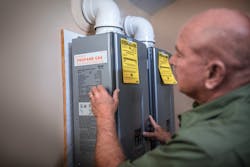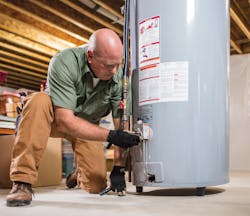Tank vs. Tankless: Choosing the Right Water Heater
By Bryan Cordill
No two families are the same, so their home’s water heater selection shouldn’t have to be either.
Water heaters are far from one-size-fits-all and contractors can deliver value for each individual customer by providing a tailored application based on the family’s water heating needs and priorities. Water heating systems have evolved over the past several years, thanks in part to higher water heating efficiency mandates and new technology, leaving many homeowners confused on what type of water heater to purchase.
Larger families want endless hot water for those crazy mornings;, budget-conscious homeowners tend to place a premium on efficiency, and people living in smaller footprint homes may care more about a compact unit that can help conserve valuable square footage.
Regardless of what the customer wants, propane water heaters provide the performance and reliability to meet the water heating needs of any project. Both storage tank and tankless propane water heaters provide exceptional benefits — whether in new builds or as a replacement for an older system in existing homes. Propane models use less energy, will save customers money, and reduce their environmental impact compared with other energy sources — all while delivering consistent, comfortable hot water.
These three questions can help contractors determine which water heating solution — tank or tankless — is a better fit for their customers and projects:
How much do upfront costs matter versus lifetime costs?
For many customers, cost is often a primary decision-making factor when choosing a water heater for their home. According to the Department of Energy, water heating accounts for approximately 18 percent of a home’s energy use. That said, reducing hot water use, employing energy-saving strategies, and choosing an efficient water heating system for a home can help customers reduce their monthly water heating bills.
Along with their longer lifespan, tankless water heaters are known to have reduced monthly energy bills, helping offset their higher purchase price. Sometimes called “on-demand” water heaters, tankless systems supply continuous hot water when needed and for this reason, have increased energy efficiency. When compared with typical electric storage tank models, propane tankless systems save more than $150 in annual energy costs.
In addition, tankless systems long-term cost effectiveness can be defined by their Annual Cost of Ownership (ACO). In a comprehensive 2015 analysis of residential water heating systems from the Propane Education & Research Council, propane tankless systems were found to offer the lowest ACO in eight out of nine scenarios covering different climates and housing types when compared with electric water heaters, heat pump water heaters, and heating oil systems. Propane tankless systems also qualify for credits and rebates, making them even more cost-effective.
Is it a high-demand home?
Homeowners may not realize the importance of selecting the right water heater until they’re suffering through a cold shower or having to “schedule” shower times around the hot water supply.
That said, it’s important to consider how much the household relies on hot water. Homes in which residents rarely run out of hot water can find value in a storage tank. This generally includes families with fewer members or couples without children, for example.
Tankless units, on the other hand, can be a better fit for larger families where showers, laundry, and food preparation often happen simultaneously. Propane tankless water heaters can typically achieve a hot water flow rate that’s three times the flow rate from electric storage or heat pump water heaters. And because propane tankless systems provide this hot water flow continuously, the hot water supply won’t run out.
Does the customer want to conserve storage space?
The energy source chosen to heat water can provide a solution for homeowners looking to take back storage space. Most notably, a 40-gallon propane storage tank water heater can deliver the same amount of hot water as a 50-gallon electric model. Propane storage tanks’ efficiency and smaller size can free up valuable space. Plus, the larger electric tank will experience greater standby losses due to its greater surface area.
If a customer is looking to eliminate the footprint of a storage tank entirely, a tankless water heater may be their best option. Tankless units are compact, versatile, and can save homeowners roughly nine to 16 square feet — making them great for tight floor plans and multi-family projects. Their size and direct-vent design also allow for flexible installation locations in closets, tight spaces, and even outdoors. Plus, propane tankless systems offer the versatility and scalability to serve any residential building, from smaller 3 GPM systems (~140 kBtu/h) to multi-unit combinations of higher capacity 4-5 GPM systems (199 kBtu/h).
Taking these three questions into consideration, and analyzing each home’s water heating needs and priorities, can help contractors ensure a great customer experience. Contractors can further set their projects apart when they include the clean, efficient performance of propane water heating technologies.
To learn more about propane water heating solutions, visit Propane.com/Water-Heating.
Bryan Cordill is director of residential and commercial business development for the Propane Education & Research Council. He can be reached at [email protected].

